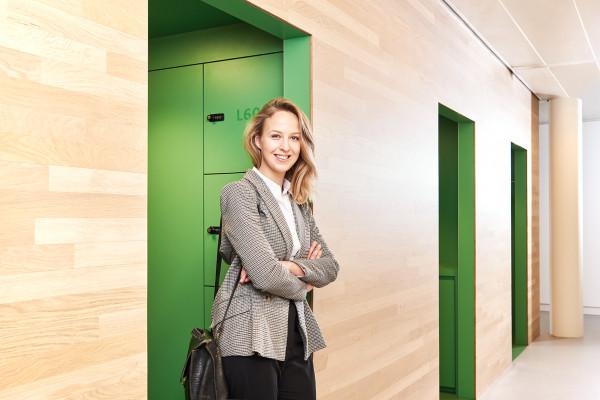The world is changing at a rapid pace. We are all facing major social challenges: the creation of a sustainable society. All this in the context of the environmental pressure on the earth, the increasing scarcity of raw materials and the growing influence of technology. This calls for a community platform where Limburg entrepreneurs from numerous sectors can find each other and strengthen each other.
With shiftLimburg, we are focusing on the four transitions: Energy, Circularity, Health & Digitization. This is how we work together towards a smarter, more sustainable and healthier Limburg.
This article is part of a 4-part series around the four transitions that are central to this platform. Annemoon Borst, transition lead circularity LIOF, explains the crucial role this transition plays in today's economy, what entrepreneurs are up against and why circular entrepreneurship is so important for Limburg.
All kinds of challenges
All kinds of challenges
You only have to open the newspaper and you see that we have all kinds of challenges. Those challenges are often approached from sustainability in a broad sense. Energy transition and circularity go hand in hand. Digitalization is an important precondition. None of the four transitions, including health, can be achieved without digitization.
Annemoon: "The earth must be given the chance to regenerate. We humans are constantly doing 'take take take'. Earth Overshoot Day marks the date when humanity's demand for ecological resources and services in a given year exceeds what the earth can regenerate in that year. Last year in the Netherlands this fell on April 27, this year on April 12. This shows that two weeks earlier we have already used up the earth's available resources for 2022."
Importance of sustainability
Losing the strong ecological argument, there is also a strong economic argument for why change is needed. Raw material prices are skyrocketing. Companies are increasingly realizing that sustainability is necessary to make and keep their businesses future-proof.
"Entrepreneurs need to ask themselves how they want to deal with raw materials or how they can take back materials and products after their useful life. Consumers, too, are beginning to look at more sustainable options. Laws and regulations are not unimportant, there are more and more regulations that companies have to comply with. From different perspectives, a huge movement is underway. As a company, it's cool to be ahead of the curve and a frontrunner. If you join at the back you will end up missing out on deals, because people will no longer choose you," says Annemoon.
Opportunity transition
Limburg has traditionally had a strong focus on the logistics, manufacturing and agri-food sectors. These are still very relevant if you look at the economic impact in Limburg. But if you look at the extent to which these sectors consume raw materials, they are also in the lead. Complemented by the construction sector and fossil driven sectors, such as chemicals and logistics.
Annemoon: "For many sectors in Limburg, circularity is a very promising transition. Regardless of the life stage of your company, startup, scale-up or established company, you can do something with circularity. We often divide these types of companies into two groups: the 'developers' and the 'applicators'. In many ways you can be engaged in circular business. Think of catering organizations that combat food waste. The target groups and opportunities for this transition are very broad."
Impact of circular business
Impact of circular business
"There are several groups of entrepreneurs who are working on circularity. The 'developers' are in the early stages, these are innovative start-ups and scale-ups. Raising funding is often a big challenge. When it comes to a new circular business model, investors have to be convinced. But these companies still have too little track record and investors too little experience with such propositions, making it more difficult to find funding resources. Moreover, these business models are considered more risky, while actually linear risk - for example, the finite nature of raw materials - should also be included for a level playing field.
Established SMEs, the "applicators," are actually having more trouble convincing existing customers. If you are going to convert from a linear to a circular business model, then you again face other challenges than companies in the early phase. Such a change has an impact on your balance sheet, your financing structure and more. Circular business also requires you to involve partners within your entire chain. So a lot of people are going to think something of it," says Annemoon.
Strong ecosystem
Annemoon: "In Limburg there are many competencies relevant to the transition, with a strong ecosystem that we can put to good use in this transition. At Chemelot they are striving for circular chemistry in the near future. Here we can take a leading position in Europe - and perhaps even worldwide. But then you have to deal with raw materials and materials differently. Another example lies in the field of logistics. How nice it would be if Venlo, as a logistics hotspot, could be the epicenter of circular return logistics. To be able to close that loop. These are great opportunities for logistics to support a circular economy.
At the Brightlands Smart Services Campus in Heerlen, the new smart services of tomorrow are being developed. We can use these, among other things, to accelerate the circular transition. Data is essential for this. For example, to map out chains, but also to enable platforms for a sharing economy and Product-as-a-Service models. It is very interesting to look at our ecosystem from that perspective and to make that cross-section. Together, we can create a circular economy in Limburg. How cool is that?"
